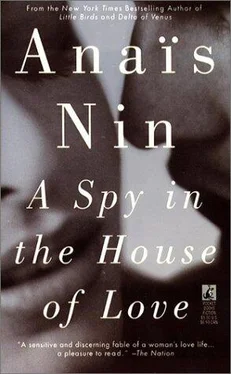At this moment she was aware of her evil, of an invisible crime equal to murder in life. It was her secret sickness, one she believed incurable, unnamable.
Having touched the source of death, she turned back to her source of life; it was only in Stravinsky’s The Firebird that Sabina found her unerring musical autobiography. It was only here she could find the lost Sabina, her self-revelation.
Even when the first sensual footsteps of the orange bird first appeared, phosphorescent tracks along magnolia forests, she recognized her first sensations, the adolescent stalking of emotion, of its shadow first of all, the echo of its dazzling presence, not yet daring to enter the circle of frenzy.
She recognized the first prologue waltzes, the paintings on glass which might shatter at the touch of warm hands, the moon’s haloes around featureless heads, the preparations for festivities and the wild drums announcing feasts of the hearts and senses. She recognized the crimson suspenses, the elevations which heightened the pulse, the wind which thrust its hieroglyphs through the swan necks of the trombones.
The fireworks were mounted on wire bodies waving amorous arms, tiptoeing on the purple tongues of the Holy Ghost, leaping out of captivity, Mercury’s wings of orange on pointed torches hurled like javelins into space sparring through the clouds, the purple vulvas of the night.
On many of the evenings Sabina spent with Mambo they did not go anywhere.
On evenings when Sabina had agreed to return to Alan at midnight, her going out with a friend would not have been fatal or too difficult to explain; but there were evenings (when she wanted to spend a few whole nights with her lover) when she had been obliged to say she was traveling, and then when Mambo suggested: “Let’s go to a movie,” the conflict was started. She did not like to answer: “I don’t want Alan to see me.” This made her feel like a child being watched, or a woman in a state of subjection, so much did her feelings about Alan seem not like those of a woman wanting to be faithful or loyal but those of an adolescent escaping home for some forbidden games. She could only see Alan as a kind father who might become angry at her lies and punish her. She would also, if she mentioned Alan’s rights, be forced to confess to Mambo the division in her affections. At times her lies seemed to her like the most intricate act of protectiveness instead of the greatest treachery. Other days she felt tempted to confess, but would be blocked by the knowledge that even if she were forgiven, Alan would expect then a change of life, and this she knew she was powerless to achieve.
At mention of the movies she would assent, but as if it were a game of chance she were playing, each time that Mambo suggested one movie, or another, or still another, she weighed them not so much for their qualities as movies, but according to what quarter of the city they were shown at, whether or not it was a movie Alan might care to see, whether it was near at hand (knowing Alan was lazy about going uptown). If she were with Alan she would have to try and remember the movies Mambo had seen, or the ones he wanted to see, and knowing how fanatical he was about movies, to gauge even those he might see twice.
Ultimately, like a gambler, she had to question her instinct.
Once seated at the movies her anxiety increased. Alan might have liked this movie enough to want to see it again, or a friend might have persuaded him to make the eft to go uptown. Could Mambo be sitting in the audience while she sat with Alan, could he have seen her walking down the aisle?
Sometimes she discarded her anxiety as nervousness. At other times she was compelled to go to the ladies’ room at the very beginning in order to be able to walk slowly and carefully down the aisle examining the crowd from behind before settling down beside Mambo or Alan. This would relieve her anxiety for awhile, until some fragment of the movie story itself would reawaken it, if a lie were pictured, a false situation, exposure. Above all if it were a spy story.
It was when she saw the lives of spies that she realized fully the tension with which she lived every moment, equal to theirs. The fear of committing themselves, of sleeping too soundly, of talking in their sleep, of carelessness of accent or behavior, the need for continuous pretending, quick improvisations of motivations, quick justifications of their presence here or there.
It seemed to Sabina that she could have offered her services or been of great value in that profession.
I am an international spy in the house of love.
When the anxiety became absolutely intolerable it was transmuted into playfulness. The excitement and risks appeared as a highly flavored, highly humorous game. Then she shifted her position entirely to that of a child escaping surveillance and being amused by her own ingenuity. Then she passed from secrecy to a need of boasting openly of her maneuvers and would describe them with such gaiety that it would shock her hearers. Both anxiety and humor became interchangeable. The pretenses, escapades, trickeries seemed to her in her humorous moods like gay and gallant efforts at protecting everyone from the cruelties of existence for which she was not responsible. Wits and good acting were employed for such justifiable ends: to protect human beings from unbearable truths.
But no one who listened ever shared her sudden gaiety: in their glances she read condemnations. Her laughter seemed a desecration, a mockery of what should be considered tragic. She could see in their eyes the wish that she should fall from this incandescent trapeze on which she walked with the aid of delicate Japanese paper umbrellas, for no guilty party has a right to such adroitness and to live only by its power to balance over the rigidities of life which dictated a choice, according to its taboos against multiple lives. No one would share with her this irony and playfulness against the rigidities of life itself; no one would applaud when she succeeded by her ingenuity in defeating life’s limitations.
These moments when she reached a humorous peak above the morass of dangers, the smothering swamps of guilt, were the ones when everyone left her alone, unabsolved; they seemed to be awaiting her hour of punishment after living like a spy in the house of many loves, for avoiding exposure, for defeating the sentinels watching definite boundaries, for passing without passports and permits from one love to another.
Every spy’s life had ended in ignominious death.
She stood waiting for the light to change at the crossroad of the beach town.
What startled Sabina and made her examine the cyclist waiting beside her was the extraordinary brilliance of his large eyes. They shone with a wet, silver sparkle which was almost frightening because it highlighted the tumultuous panic close to the surface. The molten silver was disquieting, like blinding reflectors on the edge of annihilation by darkness. She was caught in the contagion of this panic, the transparent film of precious stone trembling, about to be sucked in by a hidden cyclone.
It was only later that she noticed the delicately chiseled face, the small nose, the mouth modeled by gentleness, unrelated to the deeper disturbance of the eyes, a very young man’s mouth, a pure design on the face not yet enslaved by his feelings. These feelings not yet known to him, had not yet acid-bitten through his body. His gestures were free and nimble, the gestures of an adolescent, restless and light. The eyes alone contained all the fever.
He had driven his bicycle like a racing car or an airplane.
He had come down upon her as if he did not see trees, cars, people, and almost overlooked the stop signal.
To free herself of the shock his eyes had given her she sought to diminish their power by thinking: “They are just beautiful eyes, they are just passionate eyes, young men rarely have such passionate eyes, they are just more alive than other eyes.” But no sooner had she said this to herself to exorcise his spell than a deeper instinct in her added: “He has seen something other young men have not seen.”
Читать дальше












